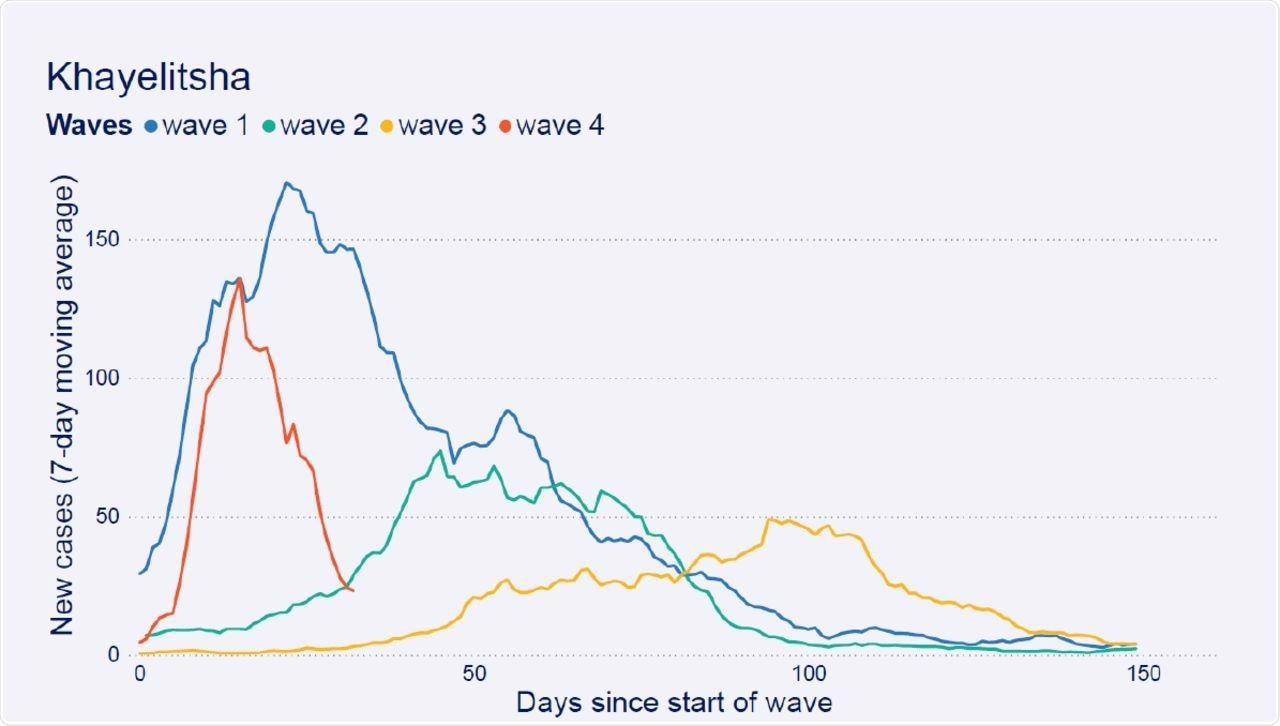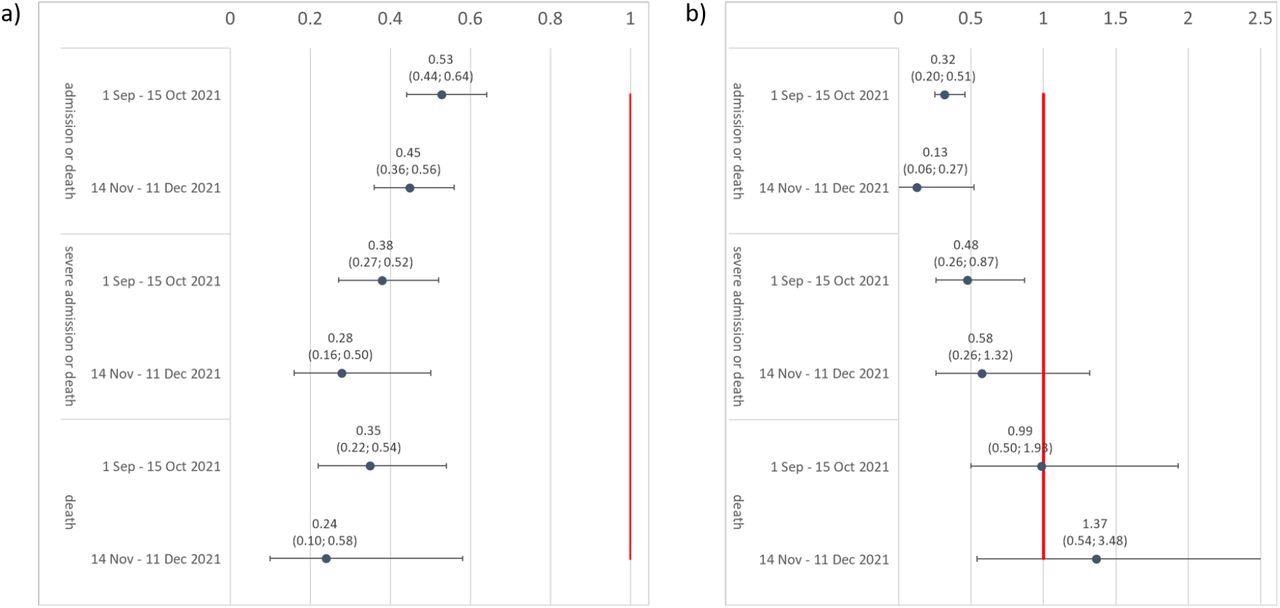
 This news article was a review of a preliminary scientific report that had not undergone peer-review at the time of publication. Since its initial publication, the scientific report has now been peer reviewed and accepted for publication in a Scientific Journal. Links to the preliminary and peer-reviewed reports are available in the Sources section at the bottom of this article. View Sources
This news article was a review of a preliminary scientific report that had not undergone peer-review at the time of publication. Since its initial publication, the scientific report has now been peer reviewed and accepted for publication in a Scientific Journal. Links to the preliminary and peer-reviewed reports are available in the Sources section at the bottom of this article. View Sources
Background
South Africa experienced a rapid surge of COVID-19 cases during the fourth wave of the COVID-19 pandemic in November 2021, driven by the severe acute respiratory syndrome coronavirus 2 (SARS-CoV-2) Omicron variant of concern (VOC). Due to the presence of more than 50 mutations across the Omicron (B.1.529) genome, this new strain of SARS-CoV-2 is associated with increased immune evasion capacity and transmissibility as compared to other VOCs.
The SARS-CoV-2 ancestral, Beta, and Delta strains caused the three previous surges of COVID-19 in South Africa. Each SARS-CoV-2 variant has been clinically more severe than the previous one and associated with a higher mortality rate.
These COVID-19 waves resulted in a high seroprevalence of about 70% from prior infection, particularly in low economic areas. However, highly seroprevalent South African regions had a relatively lower incidence of both infection and severe COVID-19 cases during the subsequent surges.
Emerging studies offer biological evidence for possible lower virulence of the Omicron variant than prior variants. However, even a relatively less virulent virus can overwhelm the healthcare system if there is a reduction in vaccine-induced or previous infection-conferred protection against the disease. Therefore, it is significant to establish the presence of prior SARS-CoV-2 infection and vaccination-associated protection from severe and milder cases of Omicron.
About the study
In the current study, the outcomes of laboratory-confirmed SARS-CoV-2 infection from four subsequent COVID-19 waves in participants aged 20 years or older were compared. The researchers also examined the extent of prior diagnosed COVID-19, unascertained infections, and vaccination-induced protection against severe Omicron infections.
The data accounting for prior infection and vaccination was collected using the public sector services in the Western Cape Province, South Africa. The study included the COVID-19 diagnosed individuals from November 14, 2021, to December 11, 2021, which represents the fourth wave and equivalent periods of previous surges.

Daily new cases (7 day moving average) by days since start of each wave in Khayelitsha sub-district, Cape Town, South Africa.
The risk of outcomes such as death, severe hospitalization or death, and any hospitalization or death, all of which occurred at or before 14 days of diagnosis, adjusted for age, gender, geography, comorbidities, prior infection, and vaccination were compared between the four waves using Cox regression.
Study findings
The study included 5,144 and 11,609 COVID-19 patients from the fourth and prior waves, respectively. The results showed that all severe outcomes in the fourth wave were substantially lower than the previous waves. Moreover, after adjusting for vaccination, a 28% reduced risk of any hospitalization or death and 59% reduced risk of death was observed.
All outcomes had a lower risk for death in the Omicron-driven fourth wave as compared to the Delta-driven third wave. Further, both the fourth and third waves had a similar level of protection against severe COVID-19 infection conferred by prior infection and vaccination. After adjusting for prior diagnosed infection and vaccination, the risk for less severe outcomes was similar in waves one and four.

The adjusted hazard ratio for associations between a) vaccination and b) prior diagnosed infection and different severe COVID-19 outcomes adjusted for patient characteristics, subdistrict, vaccination, and prior diagnosed infection using Cox regression.
Reduced risk for severe outcomes in the fourth wave was observed when the outcomes were adjusted for prior diagnosed infection and vaccination. Further reductions were also observed after accounting for unascertained infections.
The prevalence of comorbidities was similar across the four waves; however, human immunodeficiency virus type 1 (HIV-1) had a higher prevalence in waves one and four and a lower prevalence in waves two and three.
Vaccination offered protection against severe Omicron infections in the fourth wave. Even after accounting for vaccine-induced and prior infection conferred protection against Omicron, there was a further reduction of most severe outcomes in wave four, thereby indicating the lower virulence of Omicron.
Conclusions
The study findings demonstrate that severe COVID-19 outcomes in the fourth Omicron-driven pandemic wave were lower than prior waves, mostly due to protection conferred by prior infection or vaccination. However, the lower intrinsic virulence of Omicron as compared to the Delta variant contributed to an approximately 25% reduced risk of severe hospitalization or death. Further, the increased prevalence of HIV-1 in the fourth wave as compared to the previous two waves indicated the significance of accounting for unascertained infections.
According to the authors, the current study was the first to investigate the severity of COVID-19 in the fourth wave and the extent of protection from COVID-19 vaccination, previously diagnosed SARS-CoV-2 infections, and unascertained infections against Omicron compared to other SARS-CoV-2 VOCs in a highly seroprevalent setting.

 This news article was a review of a preliminary scientific report that had not undergone peer-review at the time of publication. Since its initial publication, the scientific report has now been peer reviewed and accepted for publication in a Scientific Journal. Links to the preliminary and peer-reviewed reports are available in the Sources section at the bottom of this article. View Sources
This news article was a review of a preliminary scientific report that had not undergone peer-review at the time of publication. Since its initial publication, the scientific report has now been peer reviewed and accepted for publication in a Scientific Journal. Links to the preliminary and peer-reviewed reports are available in the Sources section at the bottom of this article. View Sources
Journal references:
- Preliminary scientific report.
Davies, M., Kassanjee, R., Rosseau, P., et al. (2022). Outcomes of laboratory-confirmed SARS-CoV-2 infection in the Omicron-driven fourth wave compared with previous waves in the Western Cape Province, South Africa. medRxiv. doi.org/10.1111/tmi.13752. https://www.medrxiv.org/content/10.1101/2022.01.12.22269148v1.
- Peer reviewed and published scientific report.
Davies, Mary-Ann, Reshma Kassanjee, Petro Rousseau, Erna Morden, Leigh Johnson, Wesley Solomon, Nei-Yuan Hsiao, et al. 2022. “Outcomes of Laboratory-Confirmed\n SARS-CoV\n -2 Infection in the Omicron-Driven Fourth Wave Compared with Previous Waves in the Western Cape Province, South Africa.” Tropical Medicine & International Health 27 (6): 564–73. https://doi.org/10.1111mi.13752. https://onlinelibrary.wiley.com/doi/10.1111/tmi.13752.